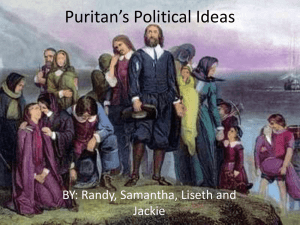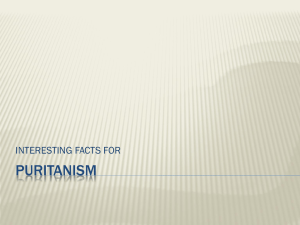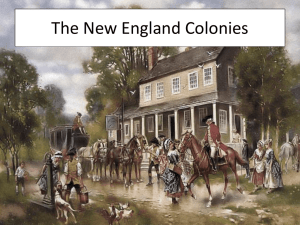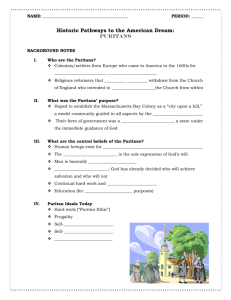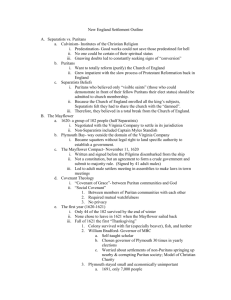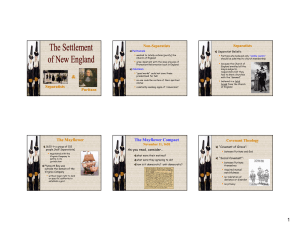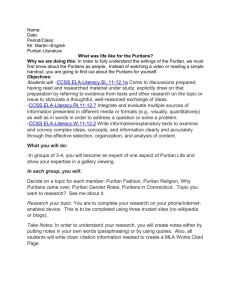American Literature- English 11
advertisement
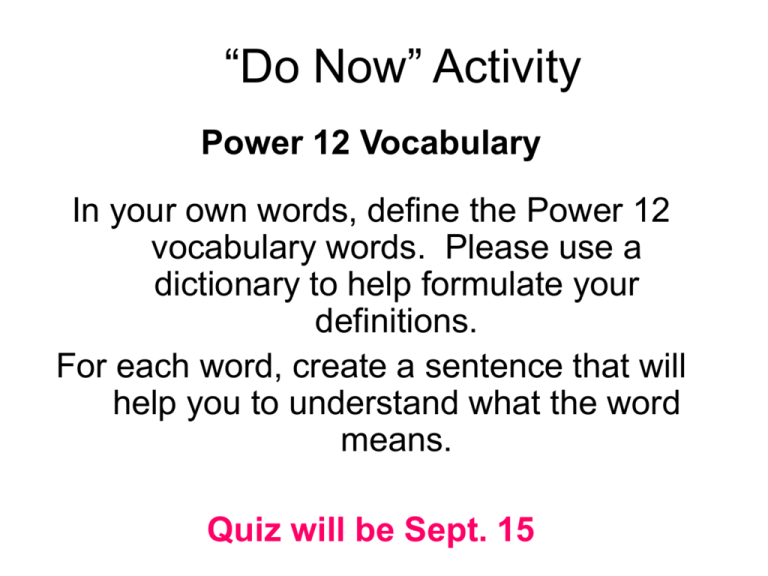
“Do Now” Activity Power 12 Vocabulary In your own words, define the Power 12 vocabulary words. Please use a dictionary to help formulate your definitions. For each word, create a sentence that will help you to understand what the word means. Quiz will be Sept. 15 Introduction to American Literature English 11 Eras of American literature KNOW THIS LIST • • • • • • • • Colonialism & Puritanism: 1620-1720 The Revolutionary Period: 1720-1820 Romanticism: 1820-1845 Transcendentalism: 1840-1855 Realism 1865-1895 Naturalism: 1895-1920 Modernism: 1920-1945 Post Modernism: 1945- present Read pages 2-13 and take notes using Cornell Notes format Objectives of Lecture/notesWhat you should know. • Understand the history of the New World in the context of other historical events. • Historical background of the Native Americans. • Characteristics of the Pilgrims/Puritans and Southern planters. • History of early American Literature. Introduction to American Literature • Voices in literature developed with the nation’s history. • Early works do not feature fiction; rather, they are primarily non-fiction works. Why do we need to understand American history to read American literature? • 1607- John Smith and group of settlers arrive at Jamestown – more than 100 years after Columbus – motivated by desires for profit and glory for England (Gold, God, Glory) – colony was almost destroyed by disease and starvation • First settlers encountered the Native American population. • Native American literature was entirely oral. • Native American oral heritage influences American literature. • Native Americans – between 12,000 and 70,000 years ago. – usually friendly to early Europeans, giving them maize, beans, squash, maple sugar, snowshoes, toboggans, etc. – Often helped Europeans to survive Who else was there? • There were two groups of early American settlers. While they had similar purposes, their motives were often different. • The two groups were: – SOUTHERN PLANTERS – NORTHERN PURITANS Southern Planters vs. Northern Puritans – Climate – Crops – social organization, (ESPECIALLY SLAVERY) – religion and religious beliefs • The Southern Planters – prosperous coastal cities, dependent on cash crop of tobacco and cotton – plantation system and smaller farmers – plantation system depended on slavery (beginning 1619) – plantation owners often belonged to Church of England, regarded themselves as aristocrats and Renaissance men Southern Planters • Only a few notable authors appeared prior to 1750 • those who were educated wrote, but only material of a practical nature. This was with good reason. They were settlers to make money, not to create art. • Southerners did not oppose fiction or drama, and the first theater was in Williamsburg Southern Planters • Many planters spent hours each day writing letters • most important figure in literary history of early south is William Byrd, who wrote “The History of the Dividing Line” PURITANS • Puritans first arrived in 1620 on Mayflower at Plymouth, Mass. • Critical of the Church of England • wanted to break away from the perceived corruptness of religious system in England Also known as Separatists • Known as Separatists because of their rejection of Church of England • Characterized by their austere beliefs and lifestyles • Survived because of the help of the Native Americans Mass. Bay Colony • Massachusetts Bay Colony also founded by religious reformers. • MBC did not break away from Church of England. • Adopted concept of “City on a Hill”- community guided in all aspects by the Bible Influence of Religion • Religion affected everything the Pilgrims, and Puritans did. • Preached plain, unadorned Christianity. • Belief system » human beings exist to glorify God. » Bible is the expression of God’s will. » Predestination- some are saved, others are damned. » believed in concept of original sin. Puritan Writing • Typical Puritan writings include – theological studies- man’s relationship w/God – hymns – histories – biographies – and autobiographies – purpose of all this writing was spiritual insight and self examination. They felt fiction and drama were sinful, and produced neither. Puritan Writing, cont. • However, Puritans did write poetry, as vehicle of spiritual expression – were not interested in poetry’s structure – only interested in its message of holiness – several excellent poets, namely Anne Bradstreet and Edward Taylor • Puritans were a highly literate community • founded Harvard in 1636 to train ministers • started free public education (you can thank them for being here right now!) Puritan Plain Style KNOW THIS! • Puritans had a clear theory of literary style. – Plain style of writing – clear statement is the highest goal – ornate or clever writing was a sign of vanity and the devil – everything had to be in accordance with God’s will Three strands that form early American literature – Puritan literature- preoccupied with sin, and salvation – Southern Planters- recorded information about their crops and their busy social lives – Native American oral tradition, which is primarily viewed as folklore, but that had important impact. Closing Activity On an index card list the 3 most important people/places/events regarding the development of American literature. Introducing Oneself Through Symbols Signs vs. Symbols Signs • Signs are images that point to something else • Little or no intrinsic meaning • Images which are asSIGNed agreed upon meanings What is a A symbol is a person, a place, an symbol? animal, or an object that suggests a meaning larger than itself. Choose the Monopoly marker that you associate with and explain your choice in writing. Choose your symbol


